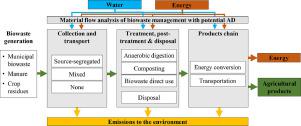Resources, Conservation and Recycling ( IF 13.2 ) Pub Date : 2021-04-04 , DOI: 10.1016/j.resconrec.2021.105569 T. Gross , L. Breitenmoser , S. Kumar , A. Ehrensperger , T. Wintgens , C. Hugi

|
Anaerobic digestion (AD) of biowaste seems promising to provide renewable energy (biogas) and organic fertilizers (digestate) and mitigate environmental pollution in India. Intersectoral analyses of biowaste management in municipalities are needed to reveal benefits and trade-offs of AD at the implementation-level. Therefore, we applied material flow analyses (MFAs) to quantify effects of potential AD treatment of biowaste on energy and fertilizer supply, water consumption and environmental pollution in two villages, two towns and two cities in Maharashtra. Results show that in villages AD of available manure and crop residues can cover over half of the energy consumption for cooking (EC) and reduce firewood dependency. In towns and cities, AD of municipal biowaste is more relevant for organic fertilizer supply and pollution control because digestate can provide up to several times the nutrient requirements for crop production, but can harm ecosystems when discharged to the environment. Hence, in addition to energy from municipal biowaste - which can supply 4-6% of EC - digestate valorisation seems vital but requires appropriate post-treatment, quality control and trust building with farmers. To minimize trade-offs, water-saving options should be considered because 2-20% of current groundwater abstraction in municipalities is required to treat all available biowaste with 'wet' AD systems compared to <3% with 'dry' AD systems. We conclude that biowaste management with AD requires contextualized solutions in the setting of energy, fertilizers and water at the implementation-level to conceive valorization strategies for all AD products, reduce environmental pollution and minimize trade-offs with water resources.
中文翻译:

印度城市中生物废物的厌氧消化:对能源,肥料,水和当地环境的影响
生物废物的厌氧消化(AD)似乎有望提供可再生能源(沼气)和有机肥料(消化物),并减轻印度的环境污染。需要对市政中的生物废物管理进行部门间分析,以揭示AD在实施层面的好处和权衡。因此,我们应用了物质流分析(MFA)来量化潜在的AD处理生物废物对马哈拉施特拉邦两个村庄,两个城镇和两个城市的能源和肥料供应,水消耗和环境污染的影响。结果表明,在乡村中,可用肥料和农作物残留物可以覆盖烹饪能源消耗的一半以上,并减少对木柴的依赖。在城镇中,市政生物废料的AD与有机肥料的供应和污染的控制更为相关,因为消化物可以为作物生产提供多达几倍的营养需求,但当排放到环境中时可能会损害生态系统。因此,除了来自市政生物垃圾的能量(可以提供EC的4-6%)外,消化物的价值评估也至关重要,但需要进行适当的后处理,质量控制和与农民建立信任。为了最大程度地权衡取舍,应考虑节水方案,因为使用“湿式” AD系统处理所有可用的生物废物需要市政目前抽取的地下水的2-20%,而“干式” AD系统则需要<3%。我们得出的结论是,利用AD进行生物废物管理需要在能源设置方面采用上下文相关的解决方案,



























 京公网安备 11010802027423号
京公网安备 11010802027423号